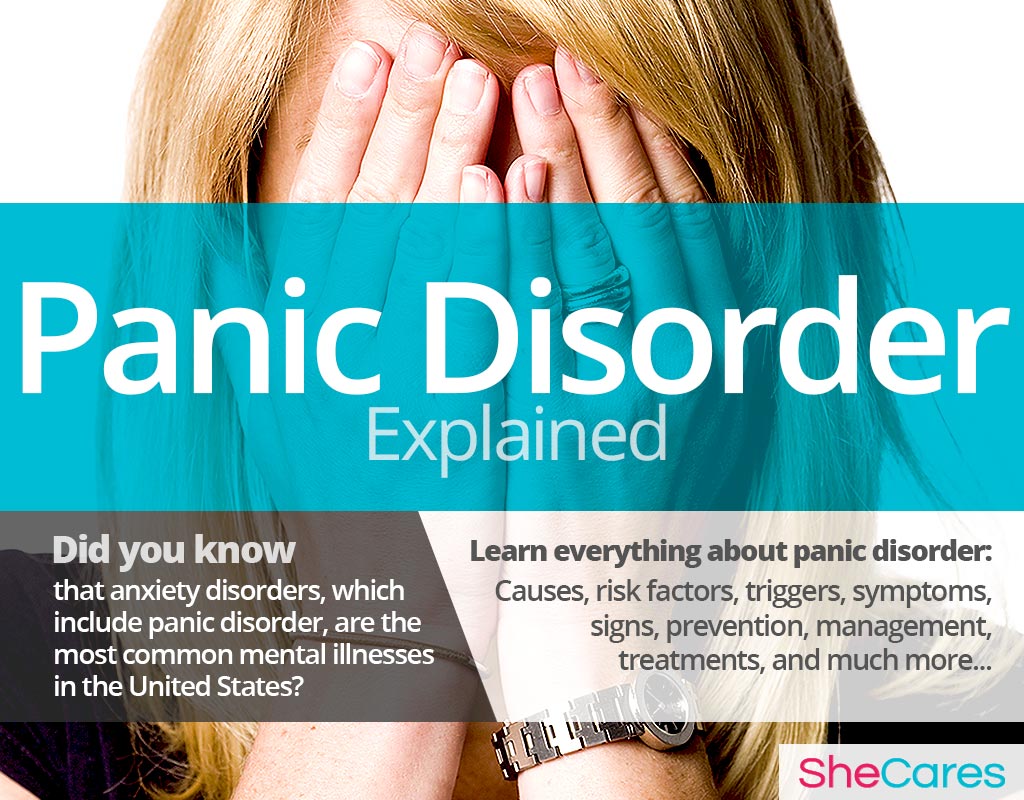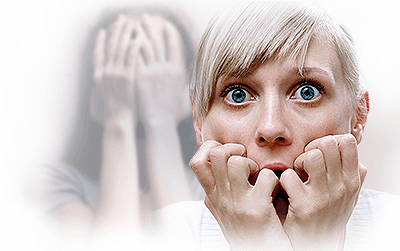About
Quick Facts about Panic Disorder
- Anxiety disorders - including panic disorder - are the most common mental illnesses in the United States.
- Anxiety disorders occur more often in women than in men.
- Most anxiety disorders begin in childhood, adolescence, and early adulthood.
Panic attacks are abrupt waves of fear that are categorized by their unexpected and debilitating intensity. The discomfort often reaches a peak within minutes and includes symptoms such as sweating, trembling, palpitations, shortness of breath, and more.
If these episodes are left untreated, they can develop into panic disorder. Panic disorder is an anxiety disorder in which a woman has regular panic attacks combined with changes in behavior or persistent anxiety over having future attacks. Most of the time, the cause of a woman's panic disorder can be attributed to external factors. However, a common cause of panic disorder for women is hormonal imbalance.
Hormonal fluctuations take place naturally during a woman's menstrual cycle and also during certain stages of reproductive life, such as puberty, pregnancy, post-partum, perimenopause, and postmenopause. These hormonal changes can negatively affect emotions as well as physical functioning, causing panic attacks and, subsequently, panic disorder.
Identifying Panic Disorder
Each woman's experience of panic attacks and panic disorder will drastically differ from the next. However, there are three measures that can help pinpoint ways in which this condition may vary: frequency, duration, and intensity.
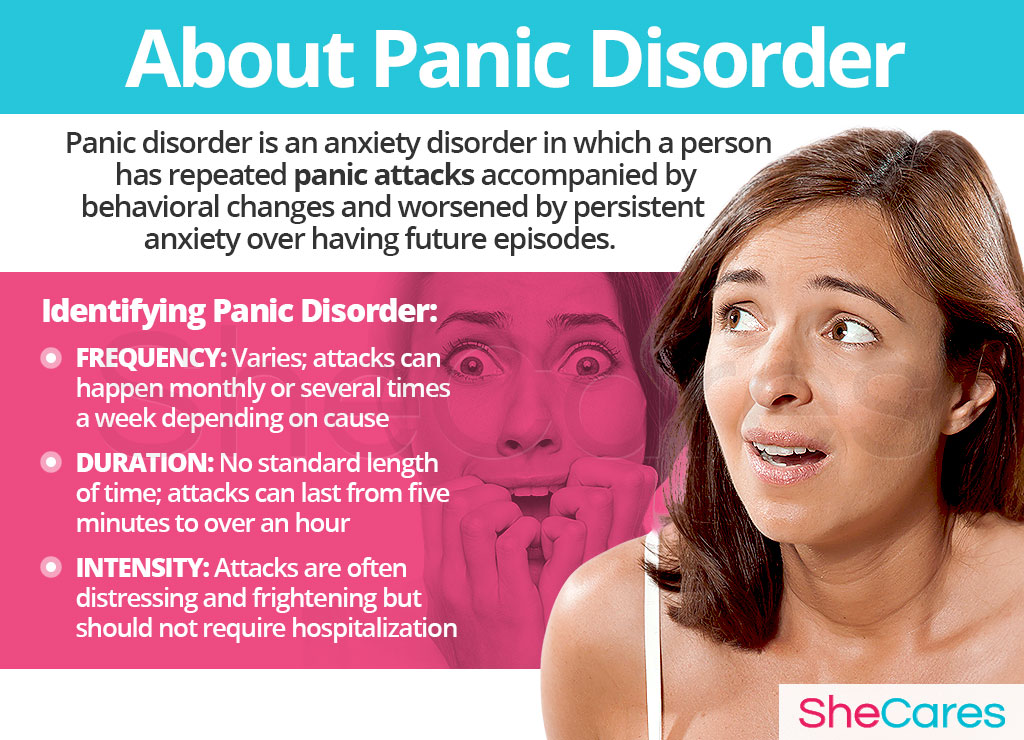
Causes
Learning about the causes of panic disorder allows a woman to better comprehend how to treat panic attacks and how to prevent them. The exact causes of panic attacks and panic disorder are often complex and unclear, including factors concerning biology and environmental stresses. However, since women suffer from anxiety disorders twice as much as men, it is believed that hormonal changes can play a crucial role in panic disorder in women.
Hormonal Causes of Panic Disorder
Since unhealthy fluctuations in hormones lead to health disorders, researches have connected shifting hormone levels to a woman's susceptibility of contracting an anxiety disorder, such as panic disorder.
Estrogen and progesterone affect the production of serotonin, commonly referred to as the “feel good” neurotransmitter. During times of significant hormonal imbalance, estrogen deficiency causes serotonin levels to drop, leading to the development of anxiety and subsequent panic attacks. In this way, we can say that recurring panic attacks and panic disorder can be caused by hormonal fluctuations women go through during their reproductive lives.
There are various phases within a woman's reproductive life in which it will be more likely for her to suffer from panic attacks and, subsequently, panic disorder, including puberty, PMS, pregnancy, post-partum, breastfeeding, perimenopause, and postmenopause.
Other Causes of Panic Disorder
While hormonal imbalance is one of the major primary causes of panic disorder during a woman's life, experts also mention that it may be caused by other situations or factors, including work-related and everyday stressors in life.
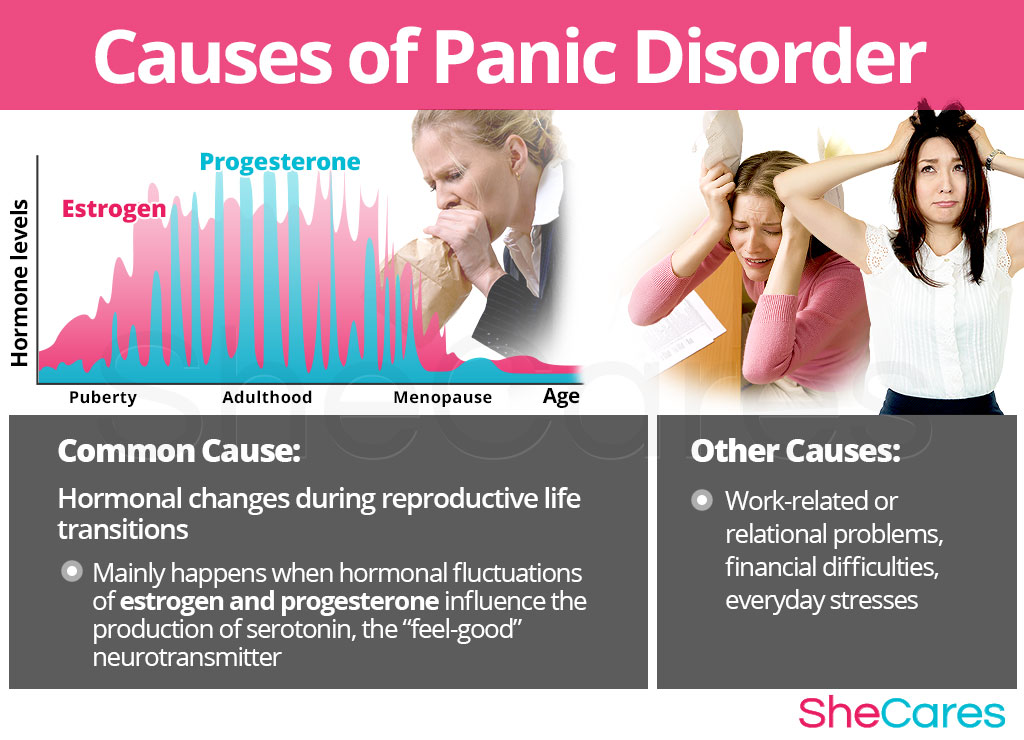
Risk Factors and Triggers
Risk Factors for Panic Disorder
Certain women have a higher probability of suffering from panic attacks and panic disorder because of inherent psychological, behavioral, and health reasons, such as stress and family history. These predisposing factors can affect a woman's hormone levels and increase the chances of her experiencing anxiety disorders throughout her reproductive life.
Triggers of Panic Disorder
Likewise, panic attacks happen out of nowhere, often without warning and without a clear trigger. They could even occur when a woman is sleeping or completely relaxed. For women who experience recurrent panic attacks, trying one's best to avoid any possible triggers can help keep a panic attack from occurring, thus preventing further advancement of panic disorder. Triggers of panic attacks include environmental factors and major life changes.
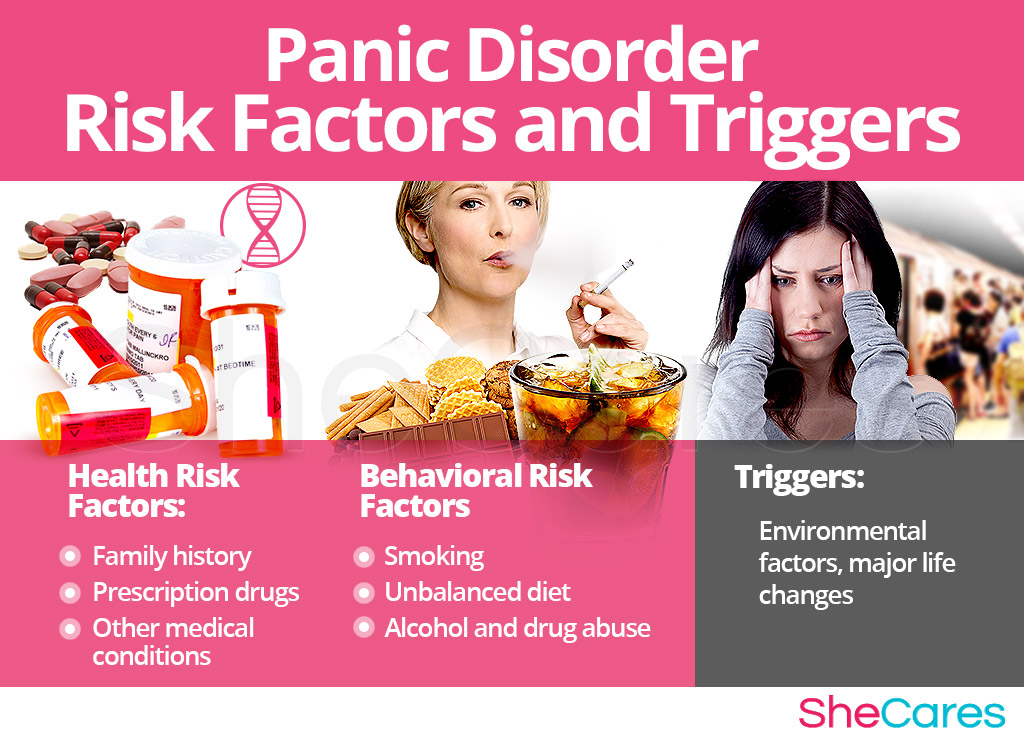
Signs and Symptoms
Panic attacks strike women at different times of the day and at different intensities. What some women experience as symptoms may seem foreign to others. However, many panic attack symptoms are common among women with panic disorder due to hormonal imbalance.
Common Symptoms of Panic Attacks
- Irregular or racing heartbeat (palpitations)
- Sweating
- Trembling or shaking
- Sense of impending doom or danger
- Fear of death or loss of control
- Nausea
- Dizziness
- Abdominal cramping
- Hot flashes
- Chest pain
- Numbness or tingling sensation
- Feeling of detachment
- Ringing in the ears
- Shortness of breath (hyperventilation)
Signs of Panic Attacks
Besides the more evident symptoms, medical signs are measurable criteria that are usually assessed by a physician. The following medical signs will most likely be taken into account by a physician when diagnosing a woman for panic disorder.
- Fluctuating blood pressure
- Rapid or irregular heartbeat
- Slightly elevated or reduced body temperature
- Abnormal blood levels of reproductive hormones
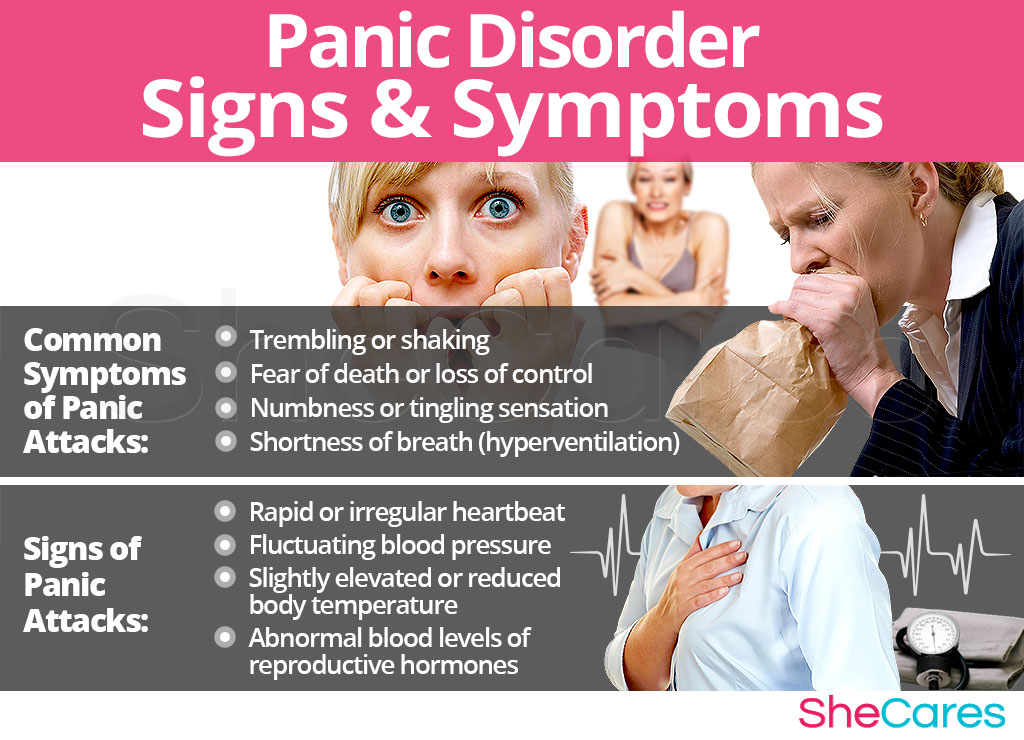
Diagnosis of Panic Disorder
To diagnose and identify panic attack symptoms, a doctor will typically perform four procedures. First, he or she should review the patient's medical history, then conduct a physical exam, and finally do a psychological evaluation. The doctor may order additional tests if necessary.
Complications of Panic Disorder
When the cause of panic attacks is not treated, panic attack symptoms can lead to further complications, which can be riskier for a woman's physical and emotional health. Nevertheless, remember that panic attacks can occur out of the blue without an apparent reason, not necessarily requiring serious medical intervention if they don't happen again. Possible complications of untreated panic disorder can include anxiety disorder, depression, and development of phobias.
Women suffering from recurring panic attacks may wish to treat or learn how to prevent future episodes. Luckily, there are healthful tips and habits that will lessen a woman's chance of suffering from panic attacks or allow her to learn how to manage them properly.
Prevention and Management
Preventing Panic Disorder
Even though there is no sure way to completely prevent the onset of panic attacks, there are a few options women can look into to lessen her chances of having an attack of anxiety or minimize the frequency of them.
Lifestyle changes for prevention are of the utmost importance, especially when considering diet, exercise, and good habits. Moreover, women may look for ways to enhance these lifestyle approaches with the use of supplements that promote hormonal balance and, therefore, help prevent or ease their symptoms, such as anxiety and panic attacks.
Lifestyle Changes for Prevention
Nutrition. Diet is key in regulating panic disorder. By eating a balanced diet composed of foods that boost serotonin levels - such as whole grains - and correct hormonal imbalance, such as phytoestrogens, it is possible to manage anxiety to some degree.
Regular exercise. Exercise is renowned as a natural and effective anti-anxiety treatment. Not only does exercise release endorphins that produce a “feel-good” emotion in the brain, but it also relieves tension and stress and boosts health, both physically and mentally. Ideally, women should aim to work out at least 30 minutes a day, 5 days a week. Workouts can include swimming, running, and aerobics. Additionally, studies have proven the efficacy of yoga and tai chi as mind-body interventions that involve a woman emotionally, spiritually, and psychologically.
Healthy habits. Some habits can be harmful for those suffering from panic attacks. Research shows that women who smoke cigarettes and consume alcohol regularly are more likely to exacerbate hormonal imbalance symptoms. It is important to avoid or minimize the consumption and use of these substances. Women should also aim to maintain a healthy weight to help balance hormone levels, reduce stress, and sleep at least seven hours a night.
Supplements. Several vitamins can help manage anxiety and panic attacks. Research indicates that fish oil, B-complex vitamins, theanine, and vitamin D are some of the best supplements needed to help boost mood and fight off anxiety. These supplements, often found in multivitamins, can be purchased at most health and supplement stores if not consumed in one's diet to achieve perfect balance.
Managing Panic Disorder
There are effective ways to manage anxiety in attempt to prevent future panic attacks from happening as well as ways to a panic attack as it is happening. In general, making daily changes and avoiding triggers can make a large difference for women who are trying to manage panic attacks and panic disorder.
Some tips and tricks can help women improve how they handle anxiety and panic attacks and give them the tools they need to get through episodes. The following are some universal guidelines all women can use, such as partaking in breathing techniques, seeking help, and doing something physical.
Furthermore, there are also specific management tips that can be followed by women during puberty, pregnancy, post-partum (including breastfeeding), perimenopause, and postmenopause.
Specific tips for managing panic disorder during puberty include educating oneself about the disorder, getting enough sleep, and reducing avoidance.
Specific tips for managing panic disorder during pregnancy include trying pregnancy yoga or meditation and strengthening relationships.
Specific tips for managing panic disorder during post-partum (including breastfeeding) are easing back into exercise and seeking extra help when needed, among others.
Specific tips for managing panic disorder during perimenopause and postmenopause include joining a support group or picking up a new hobby.
Alternative Management Tips for Panic Disorder
Alternative treatments are also a great way to manage anxiety and fight off panic attacks by reducing stress and improving emotional and physical health. Alternative treatments include massage, acupuncture, and therapy.
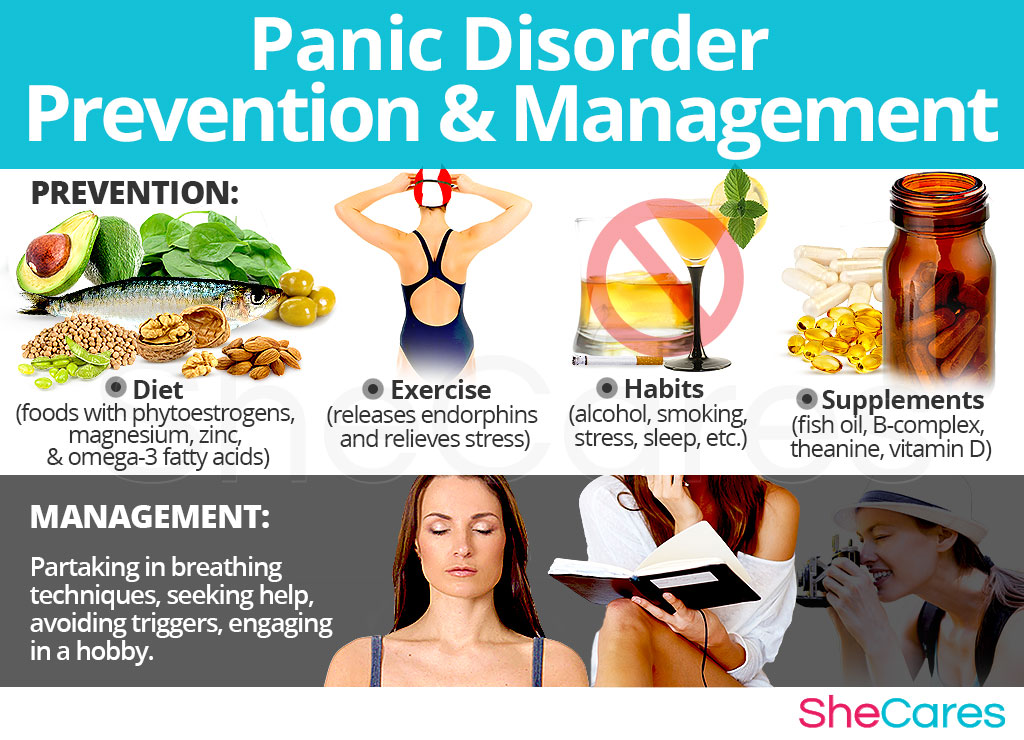
While these measures may help prevent the initial outburst of anxiety or help a woman learn how to manage anxiety and subsequent panic attacks, they are unable to treat the underlying cause of panic attacks and panic disorder. There are several panic disorder treatments that can help treat the hormonal causes.
Treatments
Recurring panic attacks - or panic disorder - can be so severe that they start to affect everyday life. Fortunately, it is possible to find an effective treatment.
Three Approaches to Treat Panic Disorder
Three levels of approaches can be considered for treating panic disorder depending on the underlying cause. These are categorized as: (1) Lifestyle Changes, (2) Alternative Medicine, and (3) Pharmaceutical Options.
If possible, women are encouraged to begin with the least risky approach, lifestyle adjustments, and then proceed to the next level of care based on their specific situation.
Lifestyle Changes
This primary level of panic disorder treatment involves the least amount of risk; although, it conversely requires the highest amount of self-discipline. Often, simple changes in lifestyle can reap huge benefits in achieving a higher overall level of health. Fundamentally, start with an improved diet, regular exercise, and healthy habits.
Although these changes will help promote over well-being, they are often not the most direct way to balance hormones, one of the leading causes of panic disorder in women. Further treatment may be necessary. Alternative medicine has proven to be an excellent way of preventing future episodes related to hormonal imbalance in a safe and natural way.
Alternative Medicine for Panic Disorder
Alternative medicines and supplements generally involve little to no risk and can be an extremely effective for preventing and treating panic disorder for good, depending on its underlying cause. In the case of herbal supplements, there are two main types to take into consideration: phytoestrogenic and hormone-regulating herbal supplements.
Phytoestrogenic herbal supplements
These supplements, like red clover, contain estrogenic components made by plants that supplement low estrogen levels in women, helping relieve anxiety and panic attacks. When a woman introduces phytoestrogens into her body, these herbs help treat the underlying estrogen deficiency behind panic attacks.
Phytoestrogens work as an effective treatment for menopausal women because they are more likely to have low estrogen levels. However, they are not necessarily effective for women in other stages of life, such as puberty.
Hormone-regulating herbal supplements
These supplements, including Macafem, stimulate the body's natural hormone production by nourishing the pituitary and endocrine glands, helping the hormonal system work more efficiently. This results in the balance of estrogen as well as other important hormones, such as progesterone.
These supplements can be considered the safest and most natural way to treat the underlying hormonal imbalance behind panicattacks and can be taken throughout a woman's life as they support the body's natural hormone production.
Morever, there are other types of herbal supplements that promote healthy hormonal balance.
A combination of approaches is usually the most effective route to take. Lifestyle changes combined with alternative medicine can ultimately help a woman overcome anxiety and panic attacks caused by hormonal imbalances. However, for some women, panic disorder and its symptoms will be so severe that more drastic treatment is necessary.
Pharmaceutical Options for Panic Disorder
Interventions at the third level involve the highest risk and often the highest costs. It is advised to speak to a trusted doctor before starting any pharmaceutical treatment or medication for panic attacks and anxiety. Not all treatments are suitable for women who find themselves at varying stages in their reproductive lives.
There are two main types of pharmaceutical options that can be prescribed to treat panic attacks: hormone-regulating medication and anti-anxiety medication.
Overall, these three approaches are not mutually exclusive. A woman may use different approaches at different times or any combination of them, depending on her specific situation. Recently, more and more women find that preventing and dealing with anxiety and panic attacks can be accomplished via a combination of healthy lifestyle and alternative treatments.
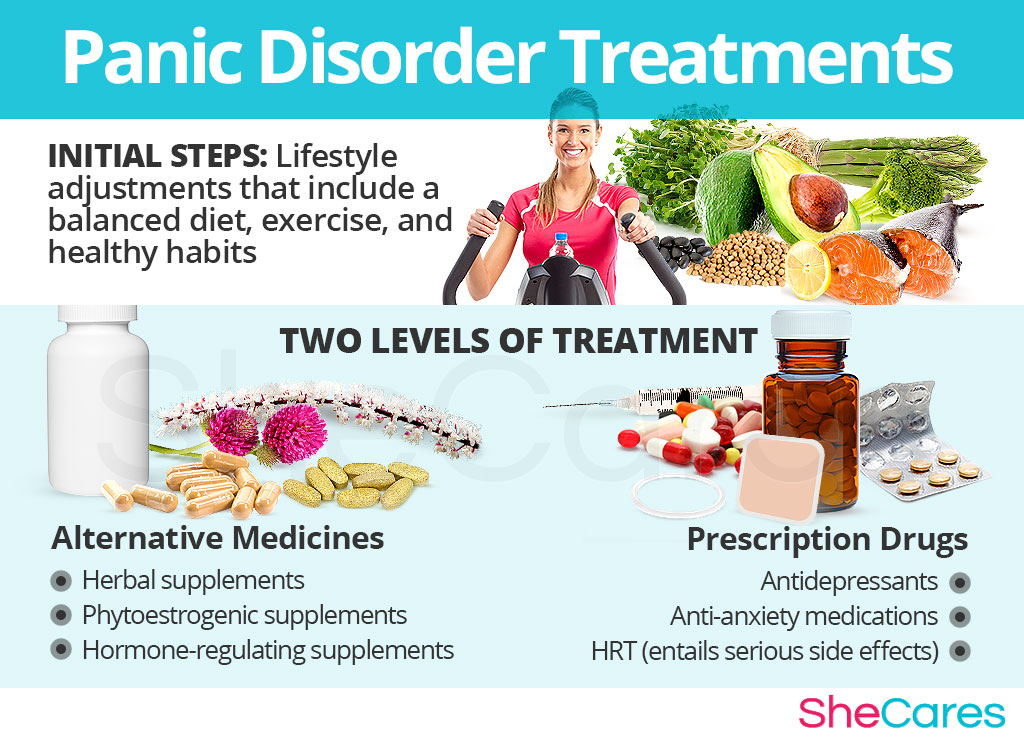
Sources
- Anxiety and Depression Association of America. (n.d.). Substance Use Disorders | Helping Your Anxious Teen Cope with a Panic Attack | Panic attack: Symptoms. Retrieved April 19, 2018, from https://adaa.org/understanding-anxiety/related-illnesses/substance-abuse | https://adaa.org/blog/helping-your-anxious-teen-cope-with-a-panic-attack | https://adaa.org/understanding-anxiety/panic-disorder-agoraphobia/symptoms
- Breslau, N. & Klein, D.F. (1999). Smoking and panic attacks: an epidemiologic investigation. Archives of General Psychiatry, 56(12), 1141-1147. Retrieved April 20, 2018, from https://www.ncbi.nlm.nih.gov/pubmed/10591292
- Brewer, S. (2002). The Daily Telegraph: Encyclopedia of Vitamins, Minerals & Herbal Supplements. UK: Constable & Robinson Ltd. Available from Google Books.
- Canan, F. & Ataoglu, A. (2008). Panic Disorder After the End of Chronic Alcohol Abuse: A Report of 2 Cases. Primary Care Companion to the Journal of Clinical Psychiatry, 10(4), 332-333. Retrieved April 19, 2018, from https://www.ncbi.nlm.nih.gov/pmc/articles/PMC2528232/
- Cleveland Clinic. (2017). Anxiety Disorders. Retrieved April 20, 2018, from https://my.clevelandclinic.org/health/diseases/9536-anxiety-disorders
- Fattah, A. (2017). Effect of Phytoestrogen on Depression and Anxiety in Menopausal Women: A Systematic Review. Journal of Menopausal Medicine, 23(3), 160-165. doi: 10.6118/jmm.2017.23.3.160
- HelpGuide.org. (n.d.). Anxiety Medication: What You Need to Know About Benzodiazepines & Other Anxiety Drugs | Panic Attacks and Panic Disorder. Retrieved April 19, 2018, from https://www.helpguide.org/articles/anxiety/anxiety-medication.htm | https://www.helpguide.org/articles/anxiety/panic-attacks-and-panic-disorders.htm
- Mayo Clinic. (2015). Panic attacks and panic disorder: Symptoms & causes | Diagnosis & treatment. Retrieved April 20, 2018, from https://www.mayoclinic.org/diseases-conditions/panic-attacks/symptoms-causes/syc-20376021 | https://www.mayoclinic.org/diseases-conditions/panic-attacks/diagnosis-treatment/drc-20376027
- Naidoo, Uma. (2016). Nutritional strategies to ease anxiety. Retrieved April 19, 2018, from https://www.health.harvard.edu/blog/nutritional-strategies-to-ease-anxiety-201604139441
- National Institute of Mental Health. (2016). Anxiety Disorders. Retrieved April 20, 2018, from https://www.nimh.nih.gov/health/topics/anxiety-disorders/index.shtml
- NHS. (2017). Panic disorder. Retrieved April 20, 2018, from https://www.nhs.uk/conditions/panic-disorder/
- Schiller, C.E. et al. (2015). The Role of Reproductive Hormones in Postpartum Depression. CNS Spectrums, 20(1), 48-59. doi: 10.1017/S1092852914000480
- Shors, T.J. & Leuner, B. (2003). Estrogen-mediated effects on depression and memory formation in females. Journal of Affective Disorders, 74(1), 85-96. Retrieved April 20, 2018, from https://www.ncbi.nlm.nih.gov/pmc/articles/PMC3374589/
- TeenMentalHealth.org. (n.d.). Panic Disorder. Retrieved April 18, 2018, from http://teenmentalhealth.org/learn/mental-disorders/panic-disorder/
- Wharton, W. et al. (2012). Neurobiological Underpinnings of the Estrogen - Mood Relationship. Current Psychiatry Reviews, 8(3), 247-256. doi: 10.2174/157340012800792957
